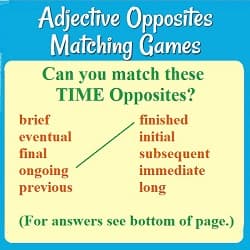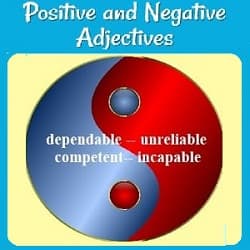Personality Vocabulary
Personality vocabulary is handy for describing friends or favorite characters in a book or movie. It’s important if you are writing a resume (CV) or preparing for a job interview.
Are you creative? Well-organized? Responsible? You need to be able to “sell” your best qualities while still being accurate. (Don't misrepresent yourself! Claiming to be better than you are could lead to losing that job. They'll notice if your work doesn’t match the skills you claimed.)
A Quick List of Useful Resume or Interview Words
(Only use these on a resume if they actually apply to you! You can practice some of them below.):
|
|
Traits, Temperaments, & Attitudes
English has many words that describe personality traits, temperament, and attitudes.
Your temperament is your general approach to life. Are you calm or excitable, orderly or free-spirited? Temperament and basic personality traits tend to be set, and don’t change much. You can change your attitudes, though—and make a real change in your life.
The resume words listed above describe some traits employers love. On the other hand, no employer wants to hire someone who is lazy, inefficient, irresponsible, or dishonest. Employers don't look for uncooperative, disorganized, or impatient, employees either. (And some will fire employees who are late all the time.)
We enjoy being around people who are generous, kind, and cheerful. It's no fun to deal with selfish and stingy* people-- or anyone who's always in a bad mood. (*Stingy means unwilling to spend money or share with others.)
Even the most cheerful person may be negative and grumpy when he isn’t feeling well. The most cautious person may do something daring and risky in an emergency. Don't forget that we are all more complicated than a few adjectives that describe us!
For more ways to describe attitudes and feelings, see Emotions Vocabulary. It has helpful illustrations, quick definitions, and a practice crossword.
You can practice some of the most common personality vocabulary below.
Practice Attitude and Personality Vocabulary
Example:
A cynic is a person who expects to find selfish motives even behind acts that seem completely altruistic (unselfish). He mocks the idea that people do anything just because they care about someone else.
A skeptic is less negative, but also thinks critically. He (or she) questions the truth of what he hears or reads and watches for bias. Skeptics, like cynics, do not assume people are telling the whole truth. (This is the meaning of the expression “take it with a grain of salt.” You need to understand that what someone is saying may not be completely accurate.)
They are aware that people may twist or mistake the facts, sometimes unconsciously, to make them fit their beliefs or interests. The opposite of skeptical is gullible. Gullible people believe anything people tell them, even if it is unlikely.
Which of these words is the closest opposite of ‘cynical’:
A. optimistic
B. trusting
C. cheerful
D. pessimistic
(The answer is ‘trusting.’ Cynics might be cheerful, though they're more likely to be pessimistic. Trust in people’s basic goodness is the direct opposite of cynicism.)
Choose the best answer for each of the next questions:
Practice More Vocabulary
Have fun while practicing these important academic adjectives with this & related opposites matching games. Try playing it now!
Here's another matching game: Positive and Negative Adjectives. Most of these describe personality traits.
How much of this Political Language do you understand? Learn the vocabulary for argument & compromise.
You might also like Social
Change Vocabulary, as well as other English
Vocabulary pages or TOEFL & IELTS Vocabulary (below.)
Home> TOEFL & IELTS Vocabulary > Practice Personality Vocabulary.
Didn't find what you
needed? Explain what you want in the search box below.
(For example, cognates, past tense practice, or 'get along with.') Click to see the related pages on EnglishHints.
| site search by freefind | advanced |









